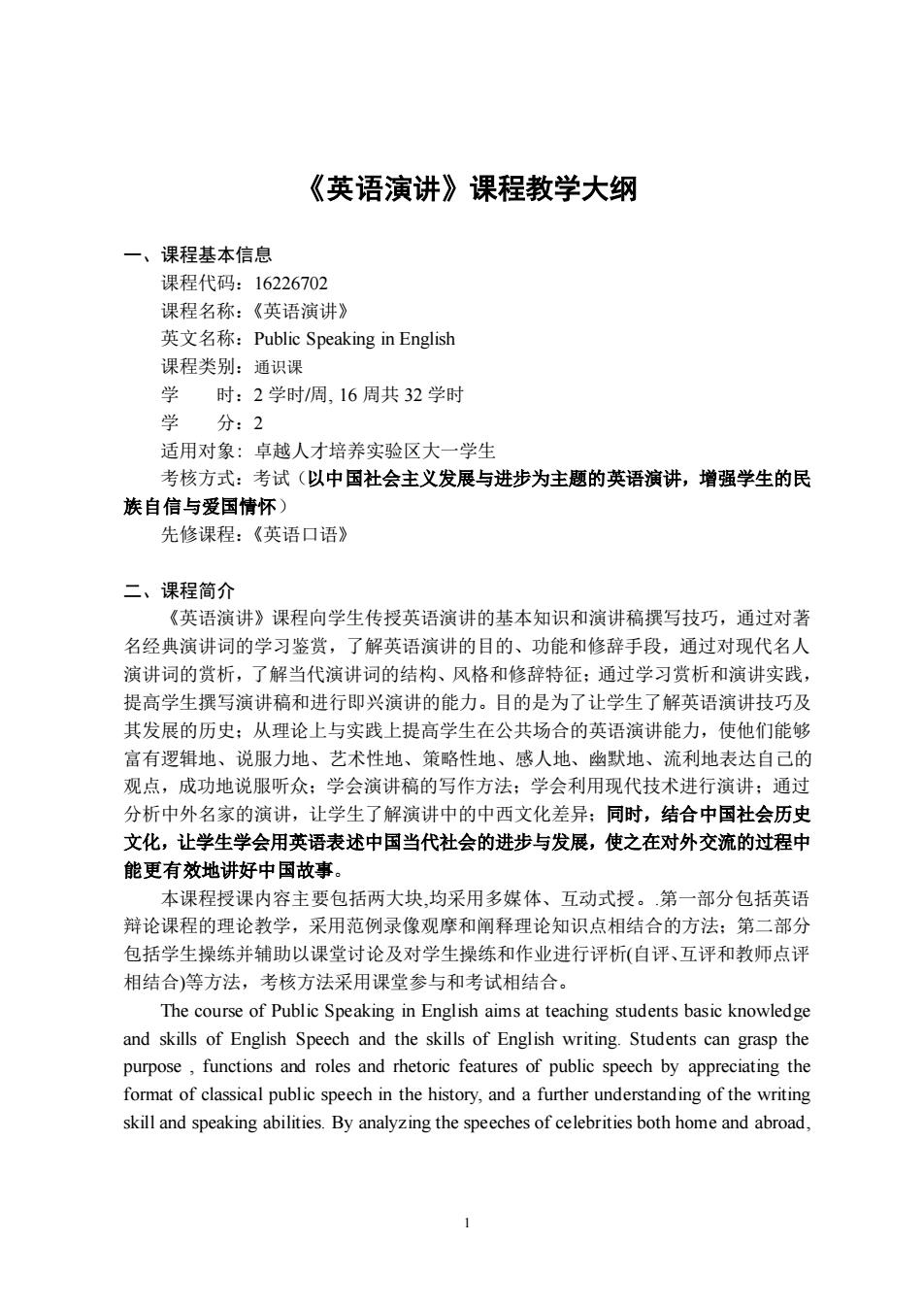
《英语演讲》课程教学大纲 一、课程基本信息 课程代码:16226702 课程名称:《英语演讲》 英文名称:Public Speaking in English 课程类别:通识课 时:2学时/周,16周共32学时 学 分分:2 适用对象:卓越人才培养实验区大一学生 考核方式:考试(以中国社会主义发展与进步为主题的英语演讲,增强学生的民 族自信与爱国情怀) 先修课程:《英语口语》 二、课程简介 《英语演讲》课程向学生传授英语演讲的基本知识和演讲稿撰写技巧,通过对著 名经典演讲词的学习鉴赏,了解英语演讲的目的、功能和修辞手段,通过对现代名人 演讲词的赏析,了解当代演讲词的结构、风格和修辞特征:通过学习赏析和演讲实践, 提高学生耀写演讲稿和讲行即兴演讲的能力。目的是为了让学生了解英语演讲技巧及 其发展的历史:从理论上与实践上提高学生在公共场合的英语演讲能力,使他们能够 宫有罗辑地、说服力地、艺术性地、簧路性地、成人地、幽默地、流利地表达白己的 观点,成功地说服听众:学会演讲稿的写作方法:学会利用现代技术进行演讲:通过 分析中外名家的演讲,让学生了解演讲中的中西文化差异;同时,结合中国社会历史 文化,让学生学会用英语表述中国当代社会的进步与发展,使之在对外交流的过程中 能更有效地讲好中国故事。 本课程授课内容主要包括两大块,均采用多媒体、互动式授。,第一部分包括英语 辩论课程的理论教学,采用范例录像观摩和阐释理论知识点相结合的方法:第二部分 包括学生操练并辅助以课堂讨论及对学生操练和作业进行评析(自评、互评和教师点评 相结合)等方法,考核方法采用课堂参与和考试相结合。 The course of Public Speaking in English aims at teaching students basic knowledge and skills of English Speech and the skills of English writing.Students can grasp the purpose,functions and roles and rhetoric features of public speech by appreciating the format of elassical public speech in the history,and a further understanding of the writing skill and speaking abilities.By analyzing the speeches of celebrities both home and abroad. 1
1 《英语演讲》课程教学大纲 一、课程基本信息 课程代码:16226702 课程名称:《英语演讲》 英文名称:Public Speaking in English 课程类别:通识课 学 时:2 学时/周, 16 周共 32 学时 学 分:2 适用对象: 卓越人才培养实验区大一学生 考核方式:考试(以中国社会主义发展与进步为主题的英语演讲,增强学生的民 族自信与爱国情怀) 先修课程:《英语口语》 二、课程简介 《英语演讲》课程向学生传授英语演讲的基本知识和演讲稿撰写技巧,通过对著 名经典演讲词的学习鉴赏,了解英语演讲的目的、功能和修辞手段,通过对现代名人 演讲词的赏析,了解当代演讲词的结构、风格和修辞特征;通过学习赏析和演讲实践, 提高学生撰写演讲稿和进行即兴演讲的能力。目的是为了让学生了解英语演讲技巧及 其发展的历史;从理论上与实践上提高学生在公共场合的英语演讲能力,使他们能够 富有逻辑地、说服力地、艺术性地、策略性地、感人地、幽默地、流利地表达自己的 观点,成功地说服听众;学会演讲稿的写作方法;学会利用现代技术进行演讲;通过 分析中外名家的演讲,让学生了解演讲中的中西文化差异;同时,结合中国社会历史 文化,让学生学会用英语表述中国当代社会的进步与发展,使之在对外交流的过程中 能更有效地讲好中国故事。 本课程授课内容主要包括两大块,均采用多媒体、互动式授。.第一部分包括英语 辩论课程的理论教学,采用范例录像观摩和阐释理论知识点相结合的方法;第二部分 包括学生操练并辅助以课堂讨论及对学生操练和作业进行评析(自评、互评和教师点评 相结合)等方法,考核方法采用课堂参与和考试相结合。 The course of Public Speaking in English aims at teaching students basic knowledge and skills of English Speech and the skills of English writing. Students can grasp the purpose , functions and roles and rhetoric features of public speech by appreciating the format of classical public speech in the history, and a further understanding of the writing skill and speaking abilities. By analyzing the speeches of celebrities both home and abroad
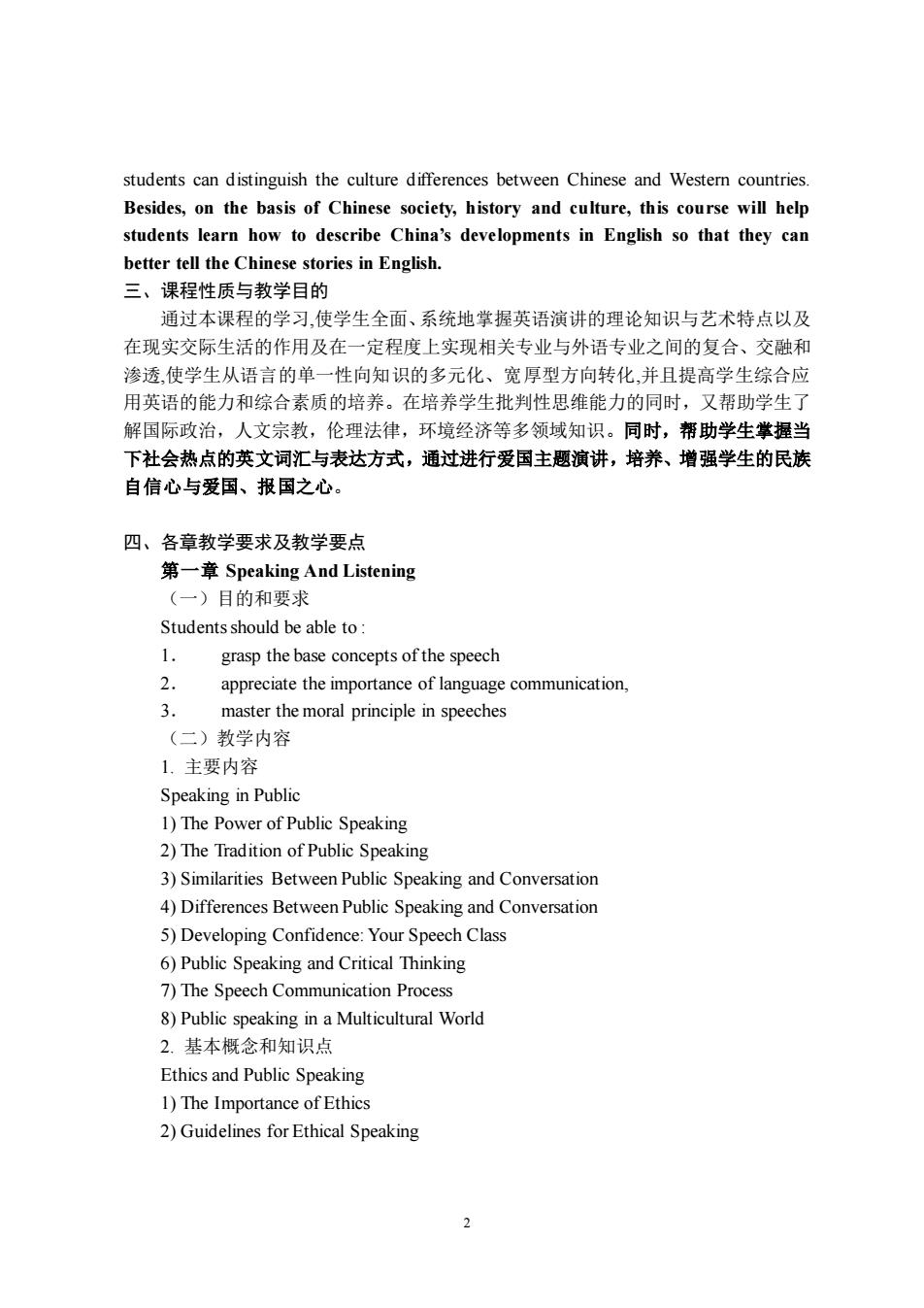
students can distinguish the culture differences between Chinese and Westem countries Besides,on the basis of Chinese society,history and culture,this course will help students learn how to describe China's developments in English so that they can better tell the Chinese stories in English. 三、课程性质与数学目的 通过本课程的学习,使学生全面、系统地掌握英语演讲的理论知识与艺术特点以及 在现实交际生活的作用及在一定程度上实现相关专业与外语专业之间的复合、交融和 渗透,使学生从语言的单一性向知识的多元化、宽厚型方向转化,并且提高学生综合应 用英语的能力和综合素质的培养。在培养学生批判性思维能力的同时,又摆助学生了 解国际政治,人文宗教,伦理法律,环境经济等多领域知识。同时,帮助学生掌握当 下社会热点的英文词汇与表达方式,通过进行爱国主题演讲,培养、增强学生的民族 自信心与爱国、报国之心。 四、各章教学要求及教学要点 第一章Speaking And Listening (一)目的和要求 Students should be able to grasp the base concepts of the speech 2 appreciate the importance of language communication, 3 master the moral principle in speeches (二)教学内容 1.主要内容 Speaking in Public 1)The Power of Public Speaking 2)The Tradition of Public Speaking 3)Similarities Between Public Speaking and Conversation 4)Differences Between Public Speaking and Conversation 5)Developing Confidence:Your Speech Class 6)Public Speaking and Critical Thinking 7)The Speech Communication Process 8)Public speaking in a Multicultural World 2基本概念和知识占 Ethics and Public Speaking 1)The Importance of Ethics 2)Guidelines for Ethical Speaking
2 students can distinguish the culture differences between Chinese and Western countries. Besides, on the basis of Chinese society, history and culture, this course will help students learn how to describe China’s developments in English so that they can better tell the Chinese stories in English. 三、课程性质与教学目的 通过本课程的学习,使学生全面、系统地掌握英语演讲的理论知识与艺术特点以及 在现实交际生活的作用及在一定程度上实现相关专业与外语专业之间的复合、交融和 渗透,使学生从语言的单一性向知识的多元化、宽厚型方向转化,并且提高学生综合应 用英语的能力和综合素质的培养。在培养学生批判性思维能力的同时,又帮助学生了 解国际政治,人文宗教,伦理法律,环境经济等多领域知识。同时,帮助学生掌握当 下社会热点的英文词汇与表达方式,通过进行爱国主题演讲,培养、增强学生的民族 自信心与爱国、报国之心。 四、各章教学要求及教学要点 第一章 Speaking And Listening (一)目的和要求 Students should be able to : 1. grasp the base concepts of the speech 2. appreciate the importance of language communication, 3. master the moral principle in speeches (二)教学内容 1. 主要内容 Speaking in Public 1) The Power of Public Speaking 2) The Tradition of Public Speaking 3) Similarities Between Public Speaking and Conversation 4) Differences Between Public Speaking and Conversation 5) Developing Confidence: Your Speech Class 6) Public Speaking and Critical Thinking 7) The Speech Communication Process 8) Public speaking in a Multicultural World 2. 基本概念和知识点 Ethics and Public Speaking 1) The Importance of Ethics 2) Guidelines for Ethical Speaking
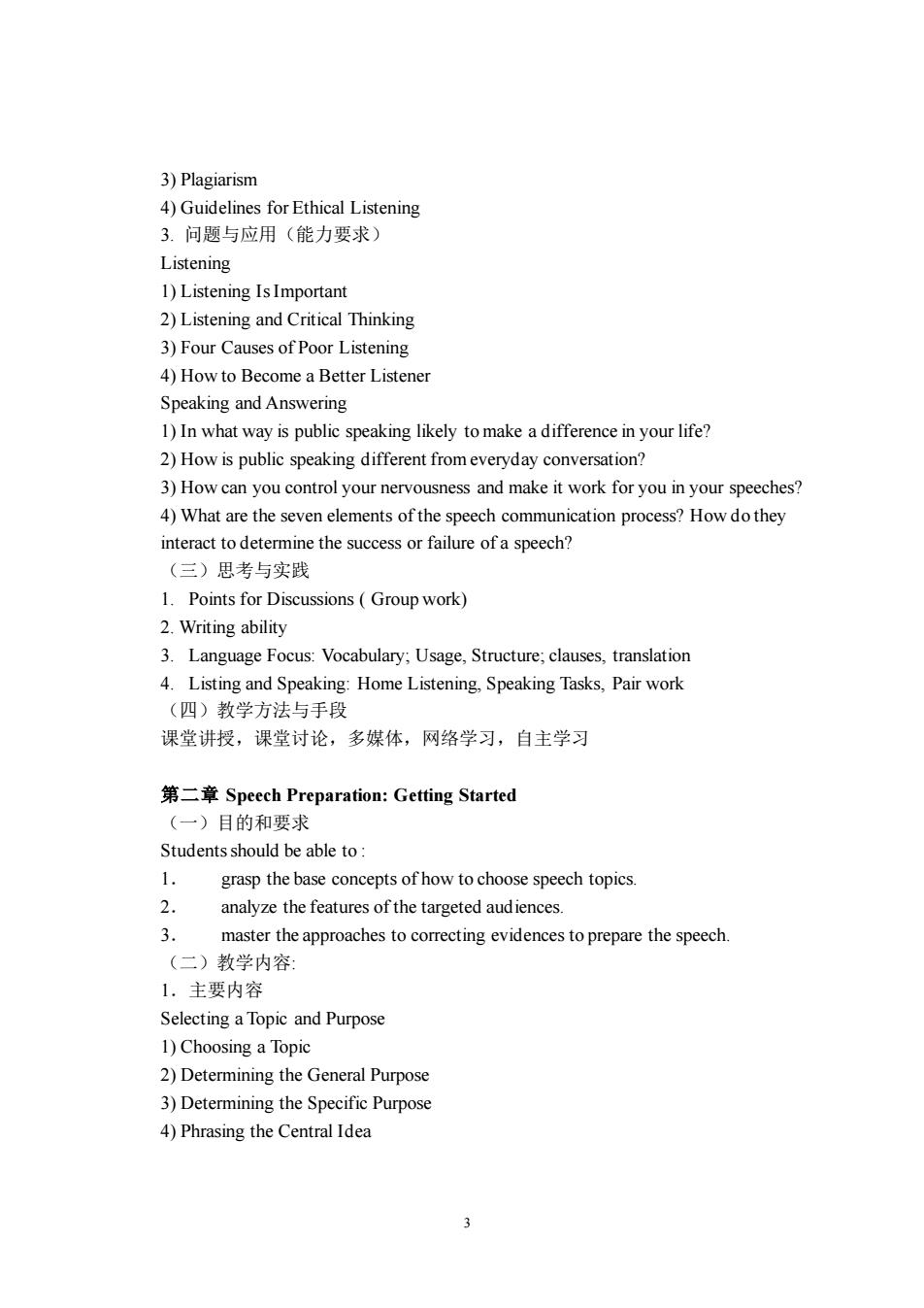
3)Plagiarism 4)Guidelines for Ethical Listening 3.问题与应用(能力要求) Listening 1)Listening IsImportant 2)Listening and Critical Thinking 3)Four Causes of Poor Listening 4)How to Become a Better Listener Speaking and Answering 1)In what way is public speaking likely to make a difference in your life? 2)How is public speaking different fromeveryday conversation? 3)How can you control your nervousness and make it work for you in your speeches? 4)What are the seven elements of the speech communication process?How dothey interact to determine the success or failure of a speech? (三)思考与实践 1.Points for Discussions(Group work) 2.Writing ability 3.Language Focus:Vocabulary:Usage,Structure;clauses,translation 4.Listing and Speaking:Home Listening,Speaking Tasks,Pair work (四)教学方法与手段 课堂讲授,课堂讨论,多媒体,网络学习,自主学习 第二章Speech Preparation:Getting Started (一)目的和要求 Students should be able to grasp the base concepts of how to choose speech topics 2. analyze the features ofthe targeted audiences 3 master the approaches to correcting evidences to prepare the speech. (二)教学内容 1.主要内容 Selecting aTopic and Purpose 1)Choosing a Topic 2)Determining the General Purpose 3)Determining the Specific Purpose 4)Phrasing the Central Idea
3 3) Plagiarism 4) Guidelines for Ethical Listening 3. 问题与应用(能力要求) Listening 1) Listening Is Important 2) Listening and Critical Thinking 3) Four Causes of Poor Listening 4) How to Become a Better Listener Speaking and Answering 1) In what way is public speaking likely to make a difference in your life? 2) How is public speaking different from everyday conversation? 3) How can you control your nervousness and make it work for you in your speeches? 4) What are the seven elements of the speech communication process? How do they interact to determine the success or failure of a speech? (三)思考与实践 1. Points for Discussions ( Group work) 2. Writing ability 3. Language Focus: Vocabulary; Usage, Structure; clauses, translation 4. Listing and Speaking: Home Listening, Speaking Tasks, Pair work (四)教学方法与手段 课堂讲授,课堂讨论,多媒体,网络学习,自主学习 第二章 Speech Preparation: Getting Started (一)目的和要求 Students should be able to : 1. grasp the base concepts of how to choose speech topics. 2. analyze the features of the targeted audiences. 3. master the approaches to correcting evidences to prepare the speech. (二)教学内容: 1.主要内容 Selecting a Topic and Purpose 1) Choosing a Topic 2) Determining the General Purpose 3) Determining the Specific Purpose 4) Phrasing the Central Idea
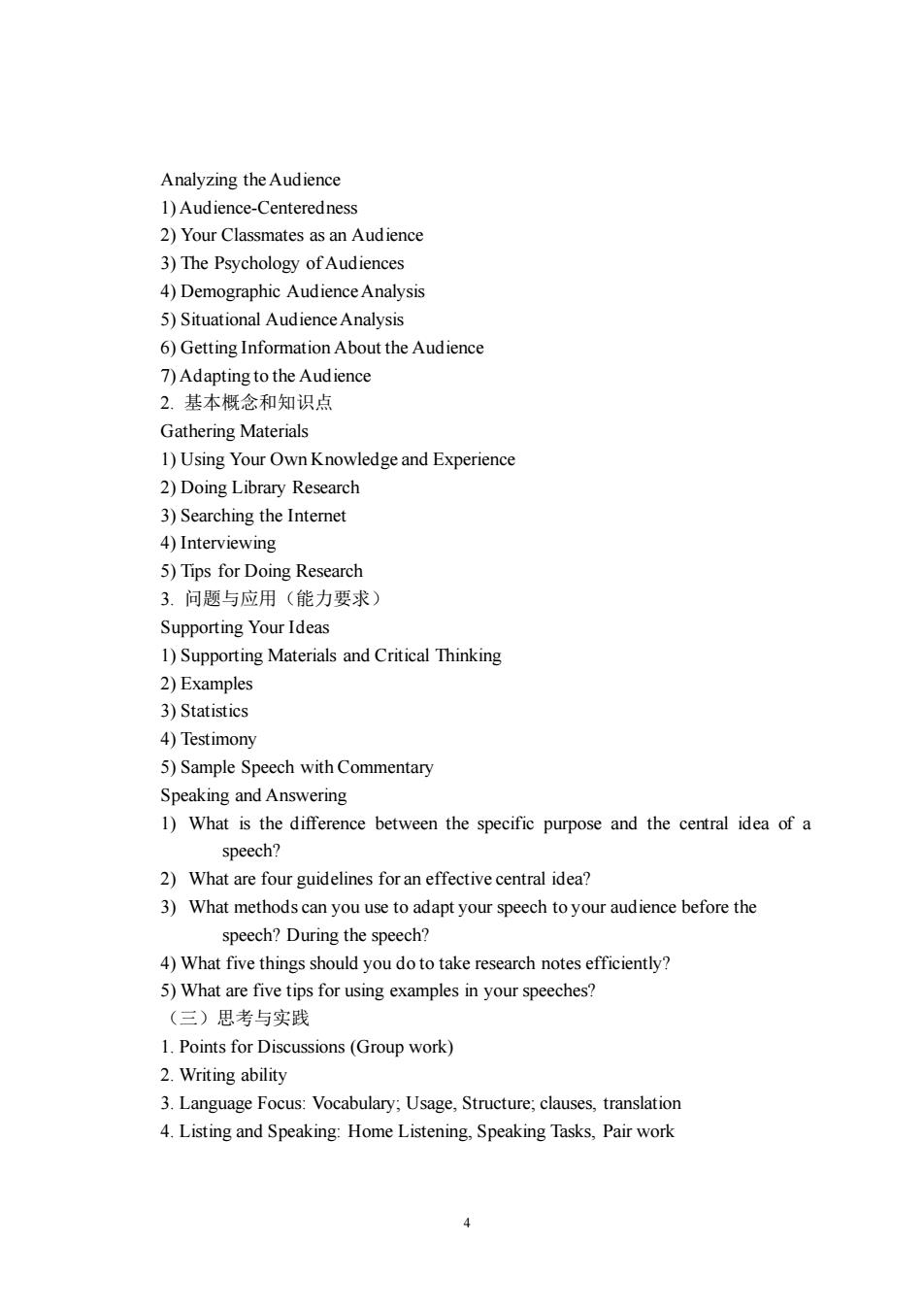
Analyzing the Audience 1)Audience-Centeredness 2)Your Classmates as an audience 3)The Psychology of Audiences 4)Demographic Audience Analysis 5)Situational Audience Analysis 6)Getting Information About the Audience 7)Adapting to the Audience 2基本概念和知识占 Gathering Materials 1)Using Your Own Knowledge and Experience 2)Doing Library Research 3)Searching the Internet 4)Interviewing 5)Tips for Doing Research 3.问题与应用(能力要求) Supporting Your Ideas 1)Supporting Materials and Critical Thinking 2)Examples 3)Statistics 4)Testimony 5)Sample Speech with Commentary Speaking and Answering 1)What is the difference between the specific purpose and the central idea of a speech? 2)What are four guidelines for an effective central idea? 3)What methods can you use to adapt your speech to your audience before the speech?During the speech? 4)What five things should you do to take research notes efficiently? 5)What are five tips for using examples in your speeches? (三)思考与实践 1.Points for Discussions(Group work) 2.Writing ability 3.Language Focus:Vocabulary:Usage.Structure:clauses,translatior 4.Listing and Speaking:Home Listening,Speaking Tasks,Pair work 4
4 Analyzing the Audience 1) Audience-Centeredness 2) Your Classmates as an Audience 3) The Psychology of Audiences 4) Demographic Audience Analysis 5) Situational Audience Analysis 6) Getting Information About the Audience 7) Adapting to the Audience 2. 基本概念和知识点 Gathering Materials 1) Using Your Own Knowledge and Experience 2) Doing Library Research 3) Searching the Internet 4) Interviewing 5) Tips for Doing Research 3. 问题与应用(能力要求) Supporting Your Ideas 1) Supporting Materials and Critical Thinking 2) Examples 3) Statistics 4) Testimony 5) Sample Speech with Commentary Speaking and Answering 1) What is the difference between the specific purpose and the central idea of a speech? 2) What are four guidelines for an effective central idea? 3) What methods can you use to adapt your speech to your audience before the speech? During the speech? 4) What five things should you do to take research notes efficiently? 5) What are five tips for using examples in your speeches? (三)思考与实践 1. Points for Discussions (Group work) 2. Writing ability 3. Language Focus: Vocabulary; Usage, Structure; clauses, translation 4. Listing and Speaking: Home Listening, Speaking Tasks, Pair work
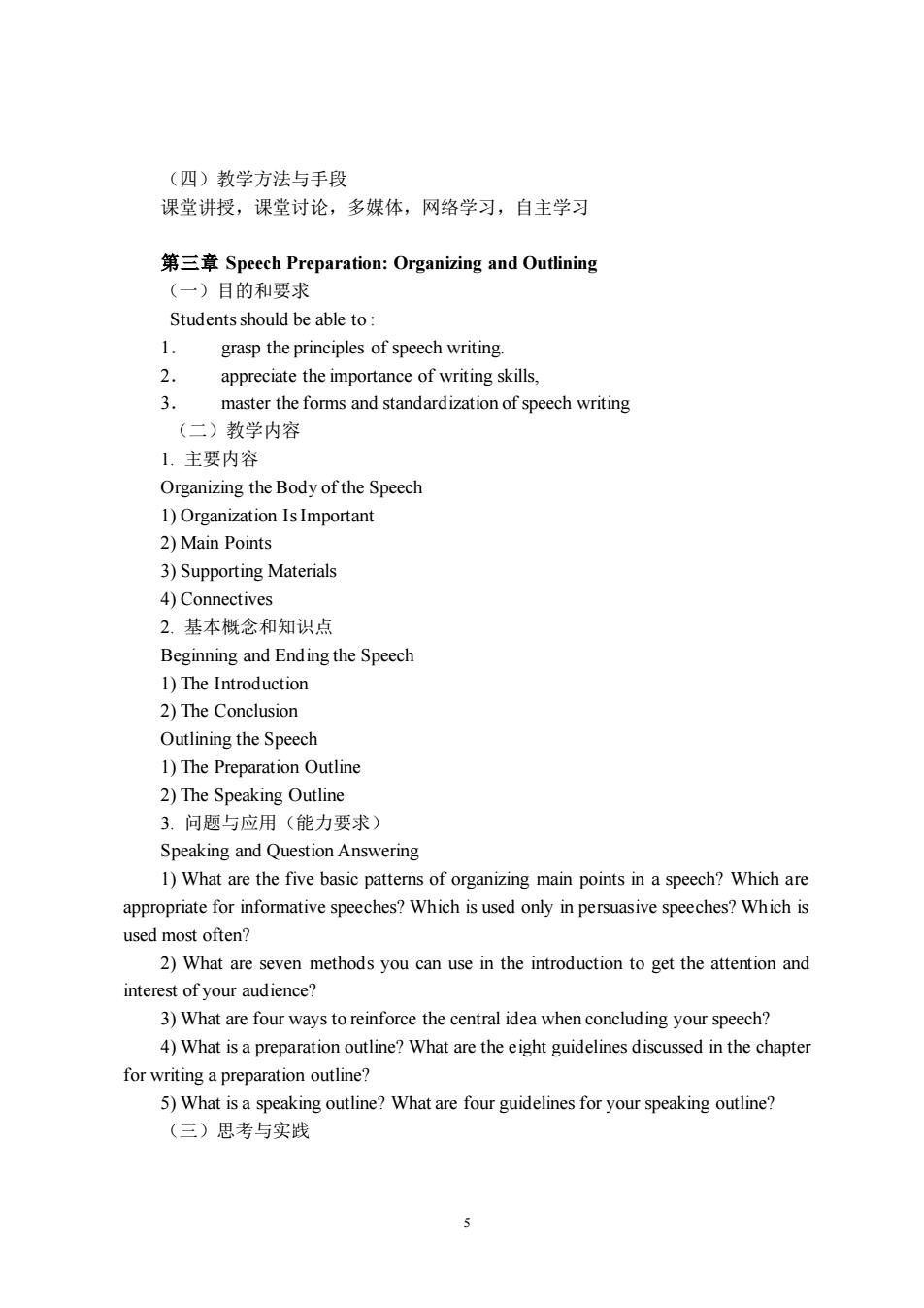
(四)教学方法与手段 课堂讲授,课堂讨论, 多媒体,网络学习,自主学习 第三章Speech Preparation:Organizing and Outlining (一)目的和要求 Studentsshould be able to grasp the principles of speech writing appreciate the importance of writing skills. 3. master the forms and standardization of speech writing (二)教学内容 1.主要内容 Organizing the Body of the Speech 1)Organization Is Important 2)Main Points 3)Supporting Materials 4)Connectives 2.基本概念和知识点 Beginning and Ending the Speech 1)The Introduction 2)The Conclusion Outlining the Speec 1)The Preparation Outline 2)The Speaking Outline 3.问题与应用(能力要求) Speaking and Question Answering 1)What are the five basic patterns of organizing main points in a speech?Which are appropriate for informative speeches?Which is used only in persuasive speeches?Which is used most often? 2)What are seven methods you can use in the introduction to get the attention and interest of your audience? 3)What are four ways to reinforce the central idea when concluding your speech? 4)What is a preparation outline?What are the eight guidelines discussed in the chapter for writing a preparation outline? 5)What is a speaking outline?What are four guidelines for your speaking outline? (三)思考与实践
5 (四)教学方法与手段 课堂讲授,课堂讨论,多媒体,网络学习,自主学习 第三章 Speech Preparation: Organizing and Outlining (一)目的和要求 Students should be able to : 1. grasp the principles of speech writing. 2. appreciate the importance of writing skills, 3. master the forms and standardization of speech writing (二)教学内容 1. 主要内容 Organizing the Body of the Speech 1) Organization Is Important 2) Main Points 3) Supporting Materials 4) Connectives 2. 基本概念和知识点 Beginning and Ending the Speech 1) The Introduction 2) The Conclusion Outlining the Speech 1) The Preparation Outline 2) The Speaking Outline 3. 问题与应用(能力要求) Speaking and Question Answering 1) What are the five basic patterns of organizing main points in a speech? Which are appropriate for informative speeches? Which is used only in persuasive speeches? Which is used most often? 2) What are seven methods you can use in the introduction to get the attention and interest of your audience? 3) What are four ways to reinforce the central idea when concluding your speech? 4) What is a preparation outline? What are the eight guidelines discussed in the chapter for writing a preparation outline? 5) What is a speaking outline? What are four guidelines for your speaking outline? (三)思考与实践